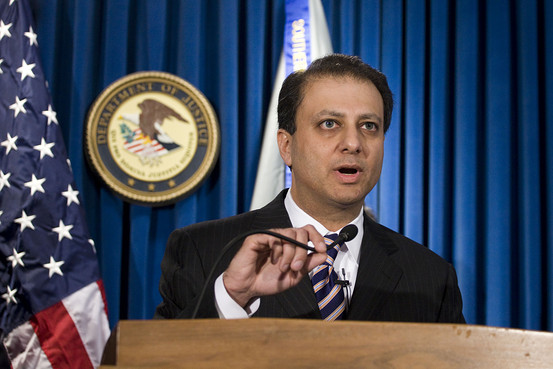
Poker Prosecutor Preet Bharara Now US AG Contender

Preet Bharara, the architect of Black Friday, could be the next US Attorney General. (Image: online.wsj. com)
Preet Bharara, the incumbent Attorney for the Southern District of New York, may be looking at a shot at the top law post in the land: US Attorney General. Reports suggest that Bharara, who initiated the Black Friday indictments of 2011 and zealously prosecuted and ultimately banished the biggest online poker companies from America, may be about to become one of the most powerful people in the US legal system.
Bharara is now being touted as the top candidate to succeed Eric Holder as Attorney General, following the embattled AG’s announcement this week that he would be stepping down for personal reasons.
What does this mean for poker players? Depending on your viewpoint, it could be positive or negative. On the one hand, Bharara brought down US online poker in its pre-Black Friday mode, but he was also the man who indicted the Full Tilt old guard, because he ultimately saw it as a “global Ponzi scheme,” that “defrauded its poker players by paying out hundreds of millions of dollars of player funds to Full Tilt Poker owners while misrepresenting to players that funds credited to their online player accounts were secure and segregated from operating funds.”
Black Friday
Before Black Friday, the legality of online poker in America was truly a gray area. The Unlawful Internet Gambling Enforcement Act (UIGEA) of 2006, which was tagged at the last minute onto the back of an anti-terrorism bill, banned US financial institutions from processing online gambling transactions for American citizens. Meanwhile, the 1961 Wire Act, a much earlier piece of legislation, banned interstate betting by “wire communication.”
Was online poker, a game of skill in which a certain amount of luck is involved, classed as gambling by UIGEA? Could the Wire Act, a piece of legislation drafted in the early sixties, relate, in any real, legal, sense to the brave new world of online gambling?
While some online poker operators, most notably partypoker, left the US post-UIGEA, others decided to stick around, testing the waters, awaiting legal clarification.
Building the Case
Bharara provided that clarification in emphatic fashion. Painstakingly, he had been building a case against Full Tilt, PokerStars, and Cereus (which operated UltimateBet and Absolute Poker), based on a New York law that stated that it was a Class A Misdemeanor to operate unlicensed games of chance in the state. And on April 30th, 2011, the US Department of Justice (DoJ) seized the domain names of America’s most popular poker sites.
Despite the fact that all the above companies were based offshore, Bharara went straight for the jugular, issuing indictments and seizing domains so that online poker was effectively shut down in the US.
Bharara is a tireless crusader against corporate crime, which is one of the reasons he is being touted for the US AG position. His face was splashed across the front cover of TIME Magazine in 2012 as “the man who held Wall Street accountable,” and his success rate at prosecuting insider traders has been formidable, securing an extraordinary 85 convictions in a row.
Bharara’s Motives
Bharara’s Black Friday initiative, then, might have been based on a fundamental dislike of online gaming, or an impassioned hatred of corporate irresponsibility, as embodied by the “global Ponzi scheme” that was Full Tilt Poker. He took down Ray Bitar et al, but is he fundamentally anti-online gambling? And if he does, indeed, become US Attorney General, will he accept the licensed online poker operators in the newly regulates states, which may soon include PokerStars, or will he embrace Sheldon Adelson’s federal ban concept?
The candidate for the post will be chosen by President Obama before being then agreed upon by the Senate, and there are others in the running, making it a potentially lengthy process. California’s AG Kamala Harris is the most apparently pro-online friendly option; she recently stepped back from signing a pro-federal ban initiative.















0 Comments